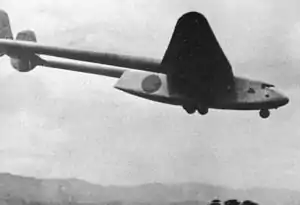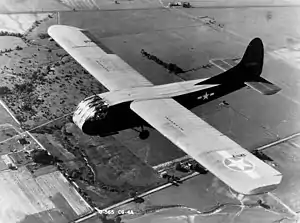List of World War II military gliders
This is a complete list of Second World War military gliders. Only vehicles that reached at least the prototype stage are included in this list.
Germany
- Blohm & Voss BV 40 (1944), fighter prototype.
- Blohm & Voss BV 246, glide bomb. Not used operationally
- DFS 230, light transport, 10 troops.
- DFS 331, heavy freight glider prototype, 1 built.
- Gotha Go 242 (1941), transport, 23 troops. 1,528 built.
- Gotha Go 244, motorised version of Go 242, 43 built and 133 Go 242B converted.
- Gotha Go 345 (1944), troop glider prototype.
- Gotha Ka 430, transport, 12 troops. 12 built.
- Messerschmitt Me 321 (1941), heavy transport 120 troops. 330 built.
- Messerschmitt Me 323 (1942), motorised development of Me 321, 211 built
- Junkers Ju 322 (1941) heavy transport prototype, 140 troops. 2 built.
India
- Hindustan Aircraft Limited G-1, prototype glider[1]
Italy
- Aeronautica Lombarda AL.12P, 12 troops, 16 built (other source claims 2 prototypes, 6 on order, no delivered).[1]
- C.A.T. TM-2 glider, 20 troops (other source claims 10 troops), 2 built. See the italian page for the description of the glider.[1]
Japan

A Ku-7 glider.
Army
- Maeda Ku-1-I Type 2, troop transport, 8 passengers and 2 crew
- Kayaba Ku-2, tailless single seat, prototype[2]
- Kayaba Ku-3, tailless single seat, prototype[2]
- Kokusai Ku-7 Manazuru "Buzzard", heavy transport, 32 passengers
- Kokusai Ku-8-II "Goose", troop transport 18 passengers and 2 crew[3]
- Yokosuka Ku-13, experimental "Shusui" light/heavy glider
Navy
- Yokosuka MXY-5
- Yokosuka MXY-6, testing Motor Glider
- Yokosuka MXY8"Akigusa", unpowered trainer for Mitsubishi J8M
Soviet Union
- Antonov A-7 (RF-8), 8 troops, 400 (approx) produced[1]
- Antonov A-40, flying tank, prototype
- BDP (S-1) glider, 20 troops, 7 built.[1]
- Gribovski G-11, 11 troops, about 100 built[4]
- KT-20 glider, 24 troops, 1 or possibly 2 built.[1]
- SAM-23 glider, 16 troops or a vehicle.[1]
- TS-25 glider, 25 troops or a vehicle. 6 built.[1]
Sweden
- AB Flygindustri FI-3, 11 troops, 5 built.[1]
Turkey
- THK-1 glider, 11 troops, prototype.[1]
United Kingdom
- Airspeed Horsa, 28[5] passengers and 2 crew or equivalent weight of cargo including small vehicles. 3,655 built.
- Baynes Bat, (1943) experimental glider for testing design of a tank carrying glider
- General Aircraft Hamilcar, (1942) 7 t (6.9 long tons) of cargo and 2 crew. 412 built.
- General Aircraft Hamilcar Mk. X, Motorised version with 2x Bristol Mercury 31 of 965 hp. 22 examples converted
- General Aircraft Hotspur, trainer 8 passengers and 2 crew. more than 1,000 built.
- Slingsby Hengist, 15 passengers and 1 crew. 18 built.
United States

A Waco CG-4A glider
- Allied Aviation XLRA
- Cornelius XFG-1, fuel carrier, 2 prototypes
- St Louis CG-5 prototype only
- Waco CG-3
- Waco CG-4A Hadrian, 13 troops and 2 crew. More than 12,000 built, known in US Navy service as "Waco LRW-1"
- Waco CG-13A
- Waco CG-15
- General Airborne Transport XCG-16A
- Bristol XLRQ Amphibious assault glider[6]
- Douglas XCG-17 – prototype based on de-engined C-47 Skytrain.
- Laister-Kauffman XCG-10A "Trojan Horse" large transport glider. Some confusion as to the differences between the XCG-10 and the XCG-10A. 2 prototypes built and flown.[7][8]
- Pratt-Read LBE
- Piper LBP
- Piper LNP
- Taylorcraft LBT
- Taylorcraft LNT
- Pratt-Read TG-32
- Schweitzer LNS
References
- Wood, Alan (1990). History of the World's Glider Forces. Patrick Stephens. ISBN 978-1-85260275-8.
- Japanese flying wings, Wooldridge, E.T.
- Donaldson, Graham (2000). "The Japanese paratroopers in the Dutch East Indies, 1941–1942". The Netherlands East Indies 1941–1942. Archived from the original on 2015-07-08. Retrieved 2007-04-29.
- Gunston, Bill (1995). The Osprey Encyclopedia of Russian Aircraft 1875–1995. London: Osprey (Reed Consumer Books). p. 82. ISBN 1 85532 405 9.
- http://d-dayrevisited.co.uk/d-day/pegasus-bridge.html
- Popular Science, May 1943, An Amphibian Glider.
- Daves Warbirds
- "Aero Web". Archived from the original on 2011-11-30. Retrieved 2011-11-12.
This article is issued from Wikipedia. The text is licensed under Creative Commons - Attribution - Sharealike. Additional terms may apply for the media files.